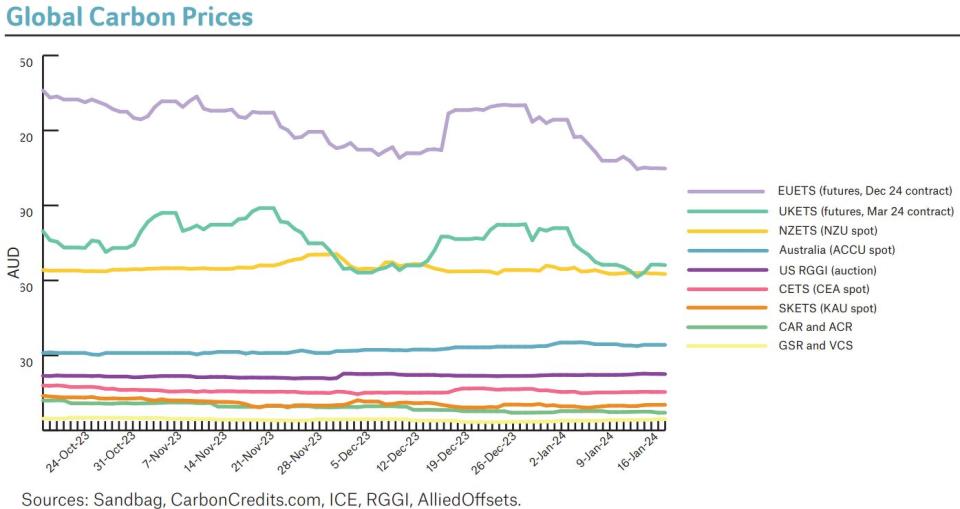23% of global emissions now covered by carbon pricing, together raising US$100 bil: Carbon Market Institute

China will relaunch its voluntary carbon crediting scheme in May, after suspending it in 2017 due to a lack of auditing standards.
Some 23% of global greenhouse gas emissions are now covered by carbon pricing, with these mechanisms jointly raising US$100 billion ($134.49 billion) in 2022 alone, according to a new report by the Melbourne-headquartered Carbon Market Institute (CMI).
CMI’s first International Carbon Market Update for 2024, released on Feb 8, offers data and insights on global carbon pricing and policy, as well as the scale of investment towards decarbonisation.
Janet Hallows, CMI’s director of climate programmes and nature-based solutions, says the growth of a high-integrity global market will have a crucial role to play, especially given the scale of finance currently being channelled into these solutions.
“The new report shows that carbon markets are already driving large amounts of finance to decarbonisation efforts that would otherwise be underfunded, with strong demand for credits resulting in record retirements since 4Q2023,” she says.

According to the CMI report, current pledges by governments will still result in a temperature rise of between 2.1°C and 2.8°C.
There is “significant potential” for carbon markets to bridge the sizeable gap in emissions reduction efforts required to get close to a 1.5°C trajectory, adds Hallows. “However, there is still work to be done to sure-up integrity measures and speed up international cooperation.”
The report follows comments from UN climate change executive secretary Simon Stiell earlier in February, stating that success in limiting temperature rise to 1.5°C would depend on key countries adopting more ambitious approaches.
The economies named by Stiell cumulatively account for 80% of global greenhouse gas emissions, and the UNFCCC executive secretary said they should all have “seriously re-engineered” their emissions targets by 2025.
In a speech delivered in Azerbaijan, which will host the UN COP29 climate negotiations in November, Stiell also called for “a fair price on carbon — traded globally with integrity”, to further drive investment in renewables and boost innovation.
It will be crucial to finalise international carbon market rules at COP29, says Hallows, so that high-integrity carbon credits can fulfil their potential to “speed-up and scale-up” global decarbonisation efforts.
“These market rules were provided for in the Paris Agreement, but some key aspects — particularly regarding a centralised global market system —have not yet been locked in,” she adds. “Finalising these rules will allow countries to be much more ambitious when they provide updates to their international climate commitments.”
The paper notes a few key developments in the space. Canada, for one, has released draft rules for a cap-and-trade scheme within the oil and gas industry; while Brazil’s Lower House has endorsed a cap-and-trade bill.
Turkey plans to launch an emissions trading scheme next year, while China will relaunch its voluntary carbon crediting scheme in May, after suspending it in 2017 due to a lack of auditing standards.
In addition, the CMI report notes that a total of 78 bilateral agreements have been signed by various countries as a first step towards trading emissions reduction units in line with Article 6.2 of the Paris Agreement.
Meanwhile, EU arrangements to establish a voluntary certification scheme for carbon removals are likely to be finalised next month.
Closer to home, Singapore’s carbon tax scheme now allows liable companies to use international carbon credits to offset up to 5% of their taxable emissions.
Australia's Clean Energy Regulator is working with the Australian Stock Exchange to establish a national carbon exchange, and is establishing a new register for Australian Carbon Credit Units.
Also, the UK will introduce a Cross-Border Adjustment Mechanism by 2027.
CMI is a member-based institute with over 150 members. They include primary producers, carbon project developers, Indigenous organisations, legal, technology and advisory services, insurers, banks, investors, corporate entities and emission-intensive industries.
View the full report by CMI here.
See Also:
Click here to stay updated with the Latest Business & Investment News in Singapore
Mediation could better resolve disputes over voluntary carbon markets
Companies should adopt internal carbon pricing, carbon offsets early: ENGIE Impact
Get in-depth insights from our expert contributors, and dive into financial and economic trends

 Yahoo Finance
Yahoo Finance 